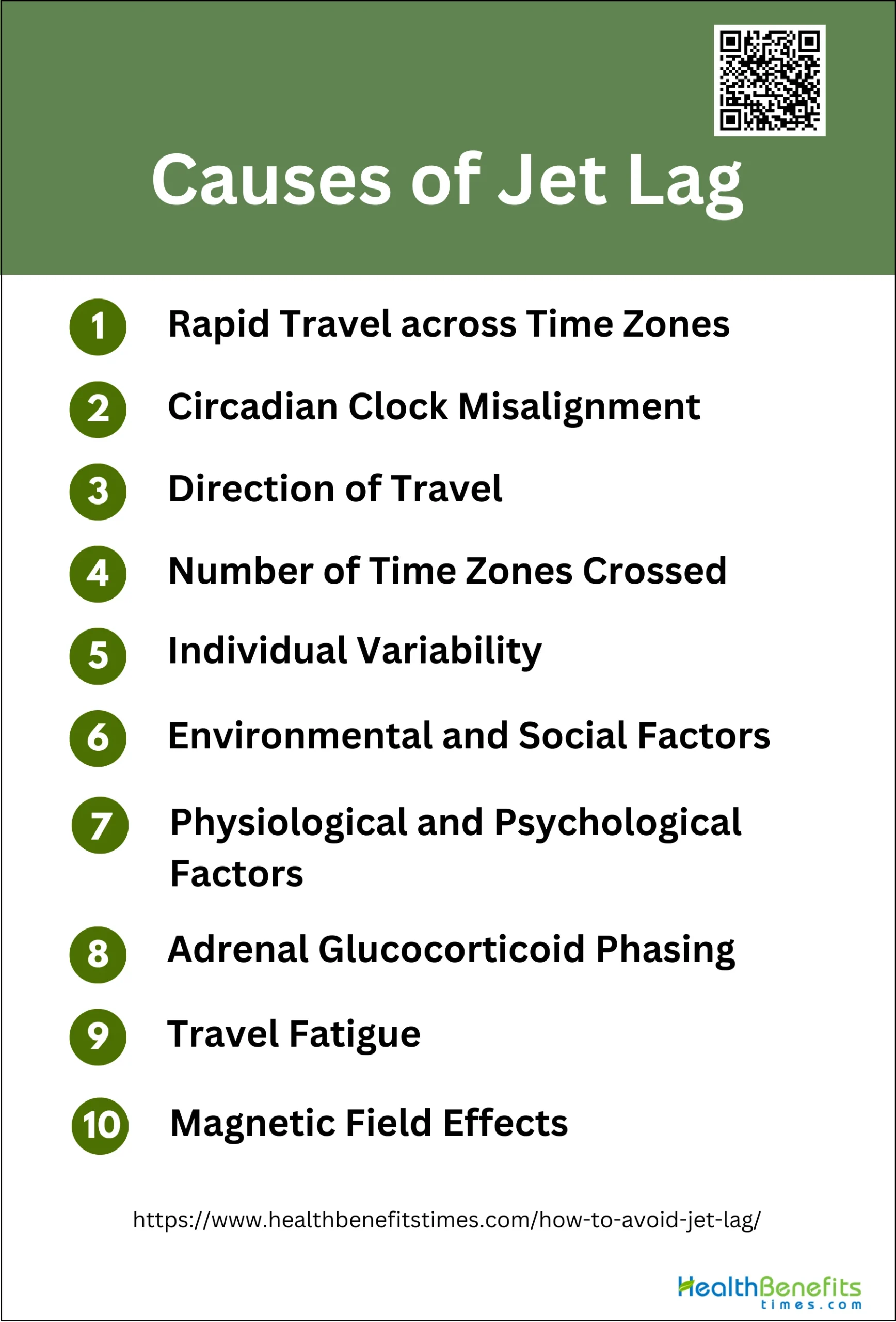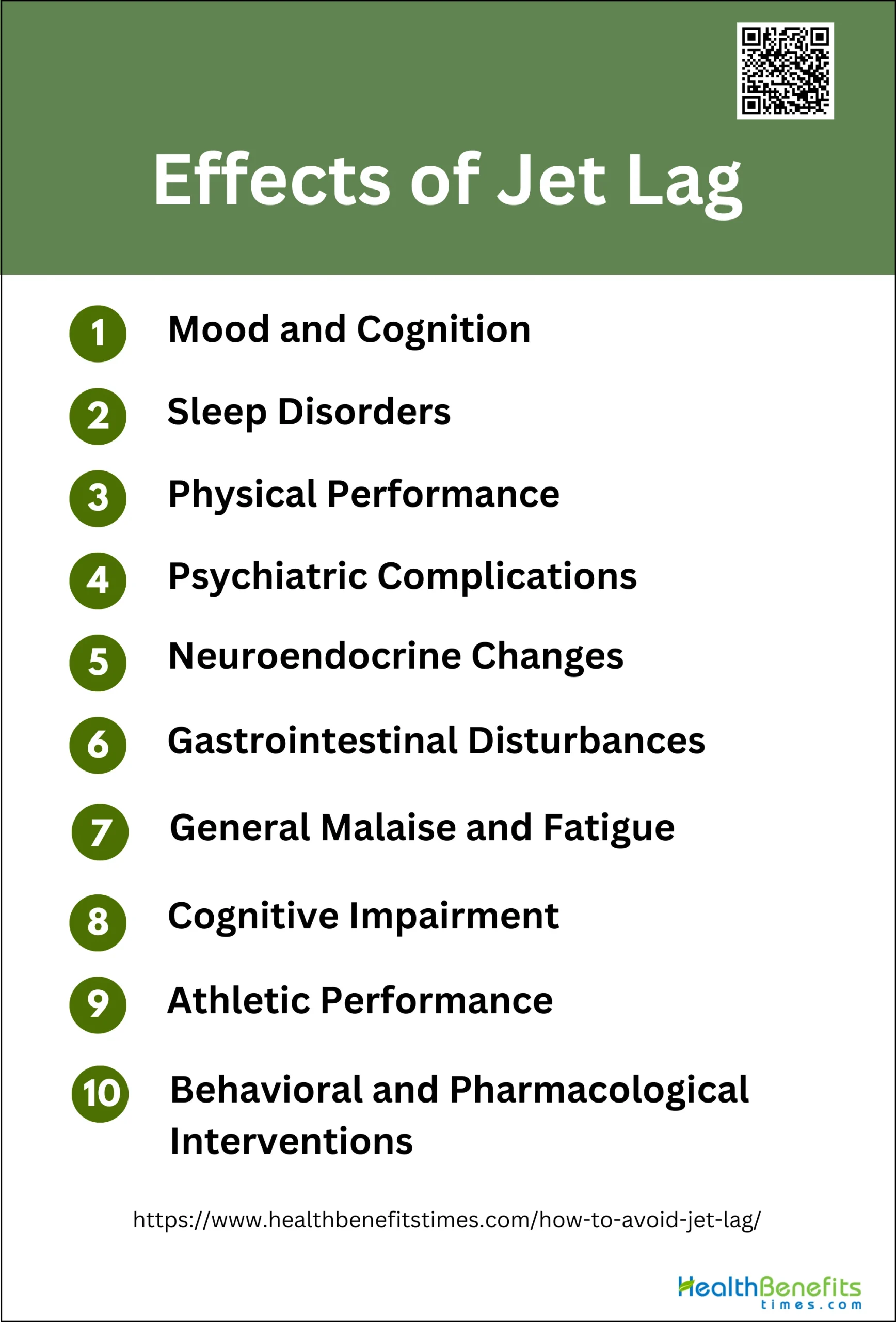 What is Jet Lag?
What is Jet Lag?
Jet lag happens when you fly across different time zones too quickly, messing up your body’s internal clock. This can lead to problems like trouble sleeping, feeling tired during the day, mood swings, fuzzy thinking, and stomach issues. How bad and how long these issues last can depend on how many time zones you crossed, which way you flew, and how your body handles it. Jet lag can get worse with travel fatigue, caused by sitting still for a long time, sleeping and eating at odd hours, and not drinking enough water. You can feel better by resting and eating well. To fight jet lag, you can try changing how you sleep and getting enough light, or even taking melatonin. While jet lag usually goes away on its own, it can really mess with how well you perform and make decisions, especially for athletes and business folks who travel a lot.
Causes of Jet Lag
Jet lag is primarily caused by the disruption of the body’s internal circadian rhythm due to rapid travel across multiple time zones. Here are the key factors contributing to jet lag:
1. Rapid Travel across Time Zones
Jet lag occurs when body rhythms are out of phase with the environment due to rapid travel across multiple time zones. This misalignment between the circadian clock and local time leads to symptoms such as insomnia, daytime sleepiness, and cognitive impairment.
2. Circadian Clock Misalignment
The circadian clock, located in the suprachiasmatic nucleus (SCN) of the hypothalamus, is slow to reset after crossing time zones. This misalignment results in endogenous signals for sleep and wakefulness that do not match the local light-dark and social schedules.
3. Direction of Travel
The direction of travel affects the severity of jet lag. Eastward travel is generally more difficult than westward travel because it requires advancing the circadian clock, which is naturally inclined to delay.
4. Number of Time Zones Crossed
The more time zones crossed, the more severe the jet lag. This is because the internal clocks are desynchronized from the external environment, and it can take several days to readjust.
5. Individual Variability
Individual differences such as age, type of individual (introvert/extrovert), and personal health can influence the severity and duration of jet lag symptoms.
6. Environmental and Social Factors
Factors such as irregular sleep times, mealtimes, dehydration, and prolonged immobility during travel can compound the effects of jet lag. Social stimuli and environmental cues also play a role in the realignment of the circadian system.
7. Physiological and Psychological Factors
Jet lag can cause phase shifts in physiological and psychological cycles, including body temperature, energy mobilization, and arousal levels. These shifts can lead to symptoms like malaise, appetite loss, and disturbed sleep.
8. Adrenal Glucocorticoid Phasing
The manipulation of adrenal glucocorticoid rhythms can regulate the speed of behavioral reentrainment. Blocking adrenal corticosterone can either prolong or shorten jet lag, depending on the time of administration.
9. Travel Fatigue
Travel fatigue, which occurs due to prolonged immobility and other factors associated with long-distance air travel, can exacerbate the symptoms of jet lag. This fatigue can be reversed with adequate diet, rest, and sleep, but jet lag symptoms persist until the circadian system is realigned.
10. Magnetic Field Effects
A less conventional theory suggests that the change in voltage in the human brain due to flying over the Earth’s magnetic field may cause neurological changes that trigger jet lag.
Effects of Jet Lag
1. Mood and Cognition
Jet lag can significantly affect mood and cognitive functions. Symptoms include irritability, depression, and difficulties with concentration.
2. Sleep Disorders

One of the most common effects of jet lag is sleep disruption, including insomnia and daytime sleepiness. This misalignment between the circadian clock and local time can lead to persistent sleep issues until the body adjusts.
3. Physical Performance
Jet lag can impair physical performance, particularly in athletes. Symptoms such as fatigue, loss of appetite, and gastrointestinal disturbances can negatively impact both individual and team performance.
4. Psychiatric Complications
There is evidence suggesting that jet lag can exacerbate existing psychiatric conditions, such as psychosis and affective disorders. However, the link between jet lag and the onset of new psychiatric conditions is less clear.
5. Neuroendocrine Changes
Jet lag can cause changes in brain function and hormone levels. For example, lower melatonin and higher thyroid hormone levels have been observed during jet lag, which correlates with changes in brain activity.
6. Gastrointestinal Disturbances
Travelers often experience gastrointestinal issues such as loss of appetite and digestive discomfort due to the disruption of their circadian rhythms.
7. General Malaise and Fatigue
General symptoms of jet lag include malaise, tiredness during the day, and a general feeling of being unwell. These symptoms are often compounded by travel fatigue, which can be alleviated with adequate rest and diet
8. Cognitive Impairment
Cognitive functions such as memory, attention, and decision-making can be impaired due to the desynchronization of the circadian rhythm.
9. Athletic Performance
Specific studies have shown that jet lag can reduce dynamic strength, anaerobic power, and work capacity in athletes, affecting their performance for several days post-travel.
10. Behavioral and Pharmacological Interventions
Strategies to mitigate the effects of jet lag include behavioral adjustments like strategic sleeping and timed exposure to bright light, as well as pharmacological aids such as melatonin.
Preparation before Travel

- Adjust Sleep Schedule: Gradually shift your bedtime and wake-up time closer to the schedule of your destination a few days before your trip. This helps your body start adjusting to the new time zone.
- Get Quality Sleep: Ensure you are well-rested by getting plenty of uninterrupted sleep in the nights leading up to your flight. This helps reduce the impact of sleep deprivation.
- Hydrate Well: Drink plenty of water before your flight to prevent dehydration, which can exacerbate jet lag symptoms.
- Limit Alcohol and Caffeine: Avoid excessive consumption of alcohol and caffeine as they can disrupt sleep patterns and contribute to dehydration.
- Light Exposure Adjustment: Start adjusting your exposure to light and darkness according to your destination’s time zone. Apps like Time shifter can help create a personalized light exposure schedule.
- Healthy Eating: Opt for lighter, healthier meals before and during your flight to avoid digestive issues that can worsen jet lag.
- Exercise: Engage in regular physical activity before your trip to improve sleep quality and overall well-being.
- Pack Sleep Aids: Bring accessories like a sleep mask, earplugs, and comfortable clothes to help you sleep better during the flight.
- Plan your Schedule: Avoid scheduling important engagements on the first day of your arrival. Allow time for rest and adjustment.
- Consult a Specialist: If you have specific health concerns, consult with a doctor, sleep specialist, or travel clinic for personalized advice on managing jet lag.
During the Flight
- Stay Hydrated: Drink plenty of water throughout the flight to prevent dehydration, which can exacerbate jet lag symptoms. Aim to drink an 8-ounce glass of water every hour you are in the air.
- Limit Alcohol and Caffeine: Avoid or minimize the intake of alcohol and caffeine as they can disrupt sleep patterns and contribute to dehydration.
- Eat Light and Healthy: Opt for lighter meals made up mostly of fruits and vegetables to prevent gastrointestinal disturbances and maintain energy levels.
- Stretch and Move Regularly: Stand up, walk around the cabin, and do simple stretches to improve blood circulation and reduce the risk of muscle stiffness and blood clots.
- Use Sleep Aids: Bring accessories like a sleep mask, earplugs, and a neck pillow to help you sleep better during the flight. Noise-canceling headphones and white noise apps can also be beneficial.
- Adjust to Destination Time: Set your watch to the destination time as soon as you board the plane and try to sleep or stay awake according to the new time zone.
- Wear Comfortable Clothing: Dress in loose-fitting, comfortable clothes and consider wearing compression socks to prevent swelling and deep vein thrombosis.
- Avoid Screens Before Sleep: Limit screen time to reduce exposure to blue light, which can interfere with melatonin production and disrupt sleep.
- Use Light Exposure Wisely: If traveling east, avoid bright light in the morning and seek it in the afternoon. For westward travel, avoid bright light in the afternoon and seek it in the morning.
- Consider Melatonin: If needed, take melatonin supplements to help regulate your sleep-wake cycle according to the new time zone
Upon Arrival
- Stay Hydrated: Continue drinking plenty of water to combat dehydration and help your body adjust more quickly to the new time zone.
- Get Natural Light Exposure: Spend time outside during daylight hours to help reset your internal clock. Natural light is a powerful cue for your circadian rhythm.
- Adapt to Local Time: Immediately start following the local schedule for meals and sleep. This helps your body adjust faster to the new time zone.
- Exercise: Engage in light physical activities such as walking, stretching, or yoga to boost your energy levels and combat fatigue.
- Avoid Napping: Resist the urge to take long naps during the day. If necessary, keep naps short (under 30 minutes) and only nap if it’s more than eight hours before your planned bedtime.
- Eat Light and Healthy: Opt for lighter meals to avoid digestive issues and help your body adjust. Eating a big breakfast in the new time zone can help reset your gut and brain.
- Limit Alcohol and Caffeine: Avoid excessive consumption of alcohol and caffeine, especially in the afternoon and evening, to improve sleep quality.
- Create a Comfortable Sleep Environment: Ensure your sleeping area is conducive to rest by controlling the temperature, reducing noise, and minimizing light.
- Use Sleep Aids if Necessary: Consider using melatonin supplements or other sleep aids under the guidance of a healthcare professional to help regulate your sleep-wake cycle.
- Be Patient and Allow Time to Adjust: Accept that jet lag is temporary and give yourself time to acclimate. Avoid scheduling important activities on the first day to allow your body to adjust.
Coping Strategies
Here is a list of coping strategies for jet lag, with one paragraph describing each strategy:
- Adjust Your Sleep Schedule Before Travel: A few days before your trip, start gradually shifting your sleep and wake times closer to the schedule of your destination. This helps your body begin adapting to the new time zone before you even depart. Shift your bedtime and wake-up time by 1-2 hours each day, moving in the direction of your destination’s time zone.
- Stay Hydrated: Dehydration can exacerbate jet lag symptoms, so it’s crucial to drink plenty of water before, during, and after your flight. Aim to drink at least 8 ounces of water per hour you’re in the air. Avoid alcohol and caffeine, which can contribute to dehydration and disrupt sleep patterns.
- Get Natural Light Exposure: Exposure to natural light helps regulate your body’s internal clock. Upon arrival at your destination, spend time outdoors during daylight hours to help reset your circadian rhythm. If you’re traveling eastward, seek out morning light; if you’re traveling westward, aim for evening light.
- Exercise and Stay Active: Engaging in light physical activities like walking, stretching, or yoga can help boost your energy levels and combat fatigue associated with jet lag. Exercise also promotes better sleep quality, which can aid in your adjustment to the new time zone.
- Adjust to Local Time Immediately: As soon as you arrive at your destination, start following the local schedule for meals, sleep, and activities. This helps your body adapt more quickly to the new time zone. Avoid napping during the day, as this can further disrupt your sleep-wake cycle.
- Create a Sleep-Friendly Environment: Ensure your sleeping area is conducive to rest by controlling the temperature, reducing noise, and minimizing light exposure. Use sleep aids like eye masks, earplugs, or white noise machines if needed.
- Consider Melatonin Supplements: Melatonin is a hormone that regulates sleep-wake cycles. Taking a small dose of melatonin (0.5-5 mg) a few hours before your desired bedtime can help reset your body clock and promote sleep in the new time zone. Consult with a healthcare professional for proper dosage and timing.
- Avoid Napping or Limit Nap Duration: While the urge to nap may be strong, long naps can further disrupt your sleep-wake cycle. If you must nap, limit it to 20-30 minutes and avoid napping too close to your desired bedtime.
- Eat Light and Healthy Meals: Heavy, rich meals can be difficult to digest and may contribute to digestive issues associated with jet lag. Opt for lighter, healthier meals, especially upon arrival, to help your body adjust more easily.
- Be Patient and Allow Time for Adjustment: Jet lag is a temporary condition, and it may take a few days for your body to fully adapt to the new time zone. Be patient with yourself and avoid scheduling important activities or engagements on the first day or two after arrival.



